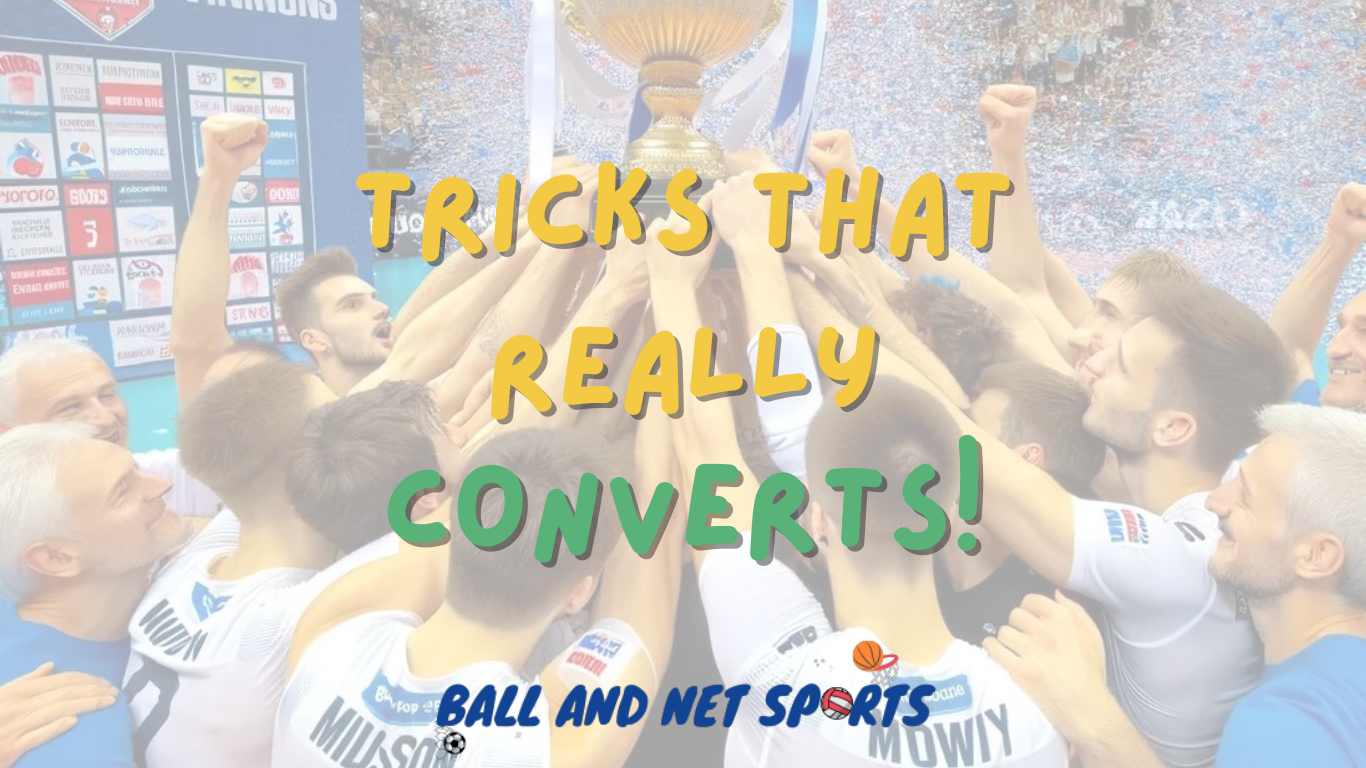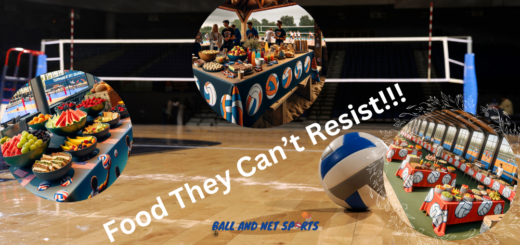How to Win Volleyball Tournament (Again and Again)

Tens of teams sign up for any volleyball tournament. But only one goes across the line to lift that ultimate glory!
What sets volleyball tournament winners apart, and what makes some teams lift trophy after trophy while other teams fail to get their hands on the prizes?
To win a volleyball tournament, a team must learn flexible gameplay strategies and utilize them depending upon the type of opponent, making things unpredictable for their rivals, fostering team communication, scouting opponents, taking crucial in-game calls, and doing strategic post-match analysis, among other things.
Here are the detailed strategies that will help you win volleyball tournaments.
Developing Flexible Game Plans Based on Team Strengths
Every team has its unique strengths (and weaknesses).
Some teams have a powerful offense, others have a sturdy defense, and some have exceptional all-rounders.
The key is to develop game plans that will utilize your strengths and exploit the weaknesses of your opponents.
Recently, we had a massive win against an opponent which only had a couple of good passers. Due to our research, we knew this weak link which helped our team win the game by scoring many points of aces only. This was all possible with the help of a well-prepared game plan. So making flexible game plans should be a part of tournament preparation strategy.
Coming up with a Plan B at the Right Time
Flexibility in strategy allows teams to adjust their approach based on the flow of the game and the opposition’s tactics.
Going without a backup plan in any volleyball tournament is a recipe for disaster.
Yes, having confidence in your plan A is good, but always remember that the opponent is also coming up with solid plans to fail your plan A. That is where Plan B will come to the rescue.
Keep Things Unpredictable for Your Opponents
Just like you are studying your opponent, they will also be doing research on you. This makes the elements of surprise absolutely necessary in your plays.
One such surprise that we have successfully used over the years is to play our top performer only in important matches. Yes, I know they need game time as well, but we compensated for that in our mockup games, intense practice sessions, and by letting them play with another team in a different tournament.
Eventually, we were able to make a surprise card entry at the eleventh hour, which helped us score big wins over the years.
But that is not it!
Incorporate other surprises as well, like changing your serving technique right in the end or switching to your plan B during the game.
Let’s say the opponent is picking up your serves very well. Then what about changing the type of the serve from floater to jump serve or topspin?
Additionally, incorporating quick attacks, like fast sets to the middle, can catch the opposing blockers off guard.
Deceptive plays, such as using a variety of hitters or disguising the set’s direction, add an element of surprise, making it harder for the opposition to predict and counter the team’s offensive moves.
Scouting Opponents: Making Hyper Specific Strategies for Your Opponents
I can’t emphasize more on the importance of studying your opponents to the maximum possible depth for a tournament win.
Here are some tactics that have helped my team win countless tournaments over the years.
| Strategy | Description | Implementation |
| Video Analysis | Review game footage to identify patterns and strategies. | Use tagging software; focus on key moments. |
| Statistical Analysis | Analyze stats like serve efficiency and attack percentage. | Utilize stat compilation platforms; compare metrics. |
| Key Player Focus | Identify and study the tendencies of key players. | Assign members to watch key players; plan to neutralize their impact. |
| Serve & Receive Patterns | Examine serving strategies and reception formations. | Identify vulnerabilities in serve direction and reception setups. |
| Tactical Tendencies | Understand the opponent’s preferred plays and strategies. | Note specific plays’ frequency; plan counter-strategies. |
| In-Game Observation | Observe live games for strategies and player dynamics. | Dedicate a scout to take live notes; focus on strategic changes. |
| Mental & Physical Notes | Note opponents’ mental and physical condition during games. | Observe body language and responses; exploit any fatigue. |
| Feedback from Other Teams | Gather insights from teams that have played against the opponent. | Discuss with other coaches or players; exchange effective strategies. |
This master plan is your way to dominance.
And once you are done with knowing your opponents, it’s time to fix the holes in your own ranks.
The most important thing to do for this is focusing on:
Team Dynamics and On-Court Communication
The synergy and communication within a volleyball team can be as crucial as individual skill in determining success, especially under the intense pressure of tournament play. Here is what you can do to master that.
Team Chemistry: A Winning Ingredient
The foundation of a tournament-winning volleyball team lies in its chemistry.
In the final moments of a fiercely contested volleyball tournament, where the crowds are on the edge of their seats and the air is thick with anticipation, skills won’t matter alone.
In these crucial seconds, the thing that matters the most is the way your team bonds with each other and brings that magical piece of play that outplays your opponent.
That is why focusing on your team chemistry is the must thing to do as it will allow you to win championship after championship.
Effective Communication
Then comes the power of communication among the teammates to win the tournament.
Without effective communication, you may be able to win a couple of matches, but it becomes next to impossible to go all the way.
These communication drills will help you make a great impact in your tournament plays.
Conflict Resolution and Maintaining Positivity
Conflicts are part and parcel of any gameplay. And when you sign up for tournaments, these conflicts can often be the only reason for your loss.
Establishing a team culture where issues are addressed openly, respectfully, and constructively is crucial to getting your team beyond the winning line.
Encouraging players to express their concerns and working together to find solutions helps in maintaining a positive and supportive team environment.
Regular feedback sessions, where players can discuss and resolve issues, are the way to go.
Psychological Strategies for Winning
Broadly speaking, I have recommended the following four aspects of Psychological training to all my athletes that have helped them win many big tournaments.
- Focus enhancement
- Stress management
- Mental resilience
- Maintaining a positive team atmosphere
In-Game Decision Making
There will be a lot of moments when in-game decision-making will take you home throughout the tournament.

Here’s how in-game decision-making can be a game-changer in volleyball tournaments:
Quick Adaptation to Opponents’ Tactics
Anticipating the opponent’s next move involves predicting the opponent’s serving strategy, their preferred set plays in crucial points, or their defensive adjustments.
Teams that excel in reading the game and preemptively adjusting their strategy often stay one step ahead, forcing their opponents into uncomfortable positions and making it difficult for them to execute their game plan.
If you have been in competitive volleyball, you will agree that you can expect a rapid shift in momentum and strategy in no time.
A team that can quickly decipher their opponent’s tactics and adapt in real-time has a considerable advantage.
Some examples of these adapting tactics involve changing blocking schemes to counter a dominant spiker, adjusting the defensive layout in response to the opponent’s serving strategy, or modifying offensive plays to exploit weaknesses in the opponent’s formation.
The ability to make these adjustments on the fly requires keen observation, strategic foresight, and decisive action from both coaches and players. Only this will help you catch your opponents off guard.
Optimal Utilization of Player Strengths
Only a team that is well aware of all of its resources will be able to win tournaments.
One of the most important aspects of this resource awareness is to know when to use a specific player and when to call them out of the court for a substitute.
For winning a volleyball tournament, coaches need to recognize when a player’s specific skills are most needed on the court.
Whether it’s a powerful server to gain an edge in tight situations, a defensive specialist to strengthen the backcourt, or a dynamic hitter to break through the opponent’s block, you need to plan when to use your substitute in a good manner. And the team that knows these tricks is most likely to bag the championship.
Effective Time-Out and Challenge Calls
Strategic use of time-outs and challenges serves as a crucial aspect of in-game decision-making for winning the volleyball games and, hence, the tournaments.
A well-timed time-out disrupts the opponent’s rhythm, allows players to catch their breath, and provides an opportunity to adjust strategies.
Similarly, careful use of challenge calls can not only potentially reverse critical points but also serve as a tactical move to give the team a momentary break and regroup.
These decisions require a blend of tactical knowledge, psychological insight, and an understanding of the game’s flow.
Pressure Management and Team Morale
In-game decisions also extend to managing player emotions and team morale during high-pressure situations.
At times, you will see your best players crumbling down to pressures and not performing as they should be.
This is where the role of coaches and team captains will come into play: who must decide when to rally the team, when to calm nerves, and how to maintain a positive and focused team dynamic to win tournaments.
Some strategies involve specific player-to-player pep talks, motivational messages during huddles, or even the tone and content of communication from the sidelines.
Physical and Mental Endurance in Tournament Play
Volleyball tournaments, especially those that span multiple days, demand physical and mental endurance for success. Managing both aspects effectively can profoundly impact a team’s performance.
Here is how to do it.
- Maintaining Peak Physical Condition in the build-up to the tournament to prevent injuries.
- Not compromising on Mental Endurance.
- Balancing Rest, Nutrition, and Physical Exertion
- Focusing on the Mental Recovery Between Matches
Post-Match Analysis
A match played is only a half job done in any volleyball tournament. The real job begins after the match for those who want to win tournaments.
Here is what a post-match strategy should look like for teams aiming to win a volleyball tournament.
Review and Reflect
- Game Footage Review: Immediately after the match, review the video footage with the team. Focus on critical moments, player positioning, and key plays to understand the game’s flow and turning points.
- Statistical Analysis: Examine the match statistics in detail, including serve accuracy, blocking efficiency, attack percentage, and reception quality. Stats provide objective insights into the team’s performance and areas needing improvement.
Collaborative Analysis
Once you have reviewed the performance, it is time for an in-depth discussion that includes:
- Team Meetings: Hold a meeting with players and coaching staff to discuss the match. Encourage open communication where players can share their perspectives and insights.
- Individual Feedback: Provide individual players with specific feedback on their performance, highlighting areas of strength and opportunities for growth.
Learning and Adapting
- Identify Patterns: Look for recurring patterns in gameplay that indicate strategic tendencies or repetitive errors that need addressing.
- Strategy Adjustment: Based on the analysis, adjust training and game strategies to address identified weaknesses and reinforce strengths.
Implementation for Future Games
- Training Focus: Design training sessions to address the specific needs identified in the post-match analysis.
- Mental and Physical Preparation: Address any mental or physical aspects that the analysis highlights. This could involve mental resilience training or physical conditioning tailored to the demands identified.
Final Words
Getting yourself crowned as a volleyball tournament champion is really a matter of a preparation stratgey that take care of all the necessary ingredients.
And each and every thing holds such an importance that ignoring any single one of them will only lead to chaos among your ranks, which will eventually result inanother competetion lost.

Ahmed is the founder of Ball and Net Sports, a platform where he writes about volleyball.
As a professional volleyball player who has participated in various national and international level volleyball competitions, he loves to teach other volleyball enthusiasts about the game.
He is now a professional volleyball coach who organizes volleyball camps and social events for talent hunting for top volleyball teams.
As a volleyball talent-hunting specialist, he loves to teach people how they can make their game better in the fast-paced volleyball environment where it is extremely difficult to get quality content free of cost.



